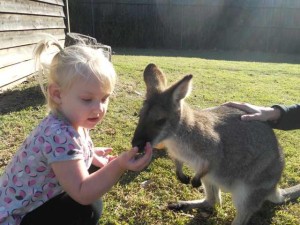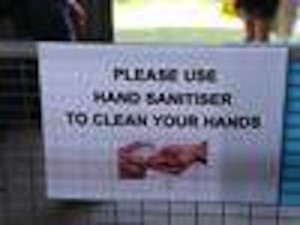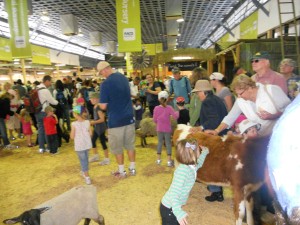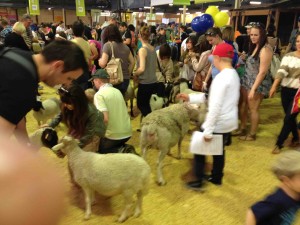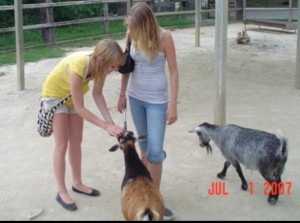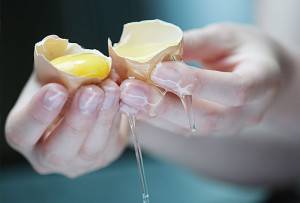We didn’t go to the EKKA this year.
After two years of observing dodgy practices in the animal interaction areas – a controlled-chaos where hundreds of parents and their kids roam in a large enclosure with goats, sheep, cattle, and shell out some cash to feed the animals from a cup – I decided it was time to pass.
And I’ve had enough people cheerfully tell me after two years in Brisbane that people get sick at the EKKA (otherwise known as the Royal Queensland Show, originally called 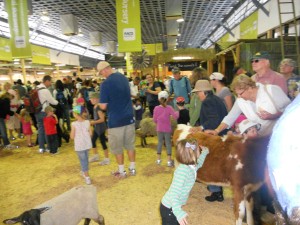 the Brisbane Exhibition and usually shortened to EKKA).
the Brisbane Exhibition and usually shortened to EKKA).
Unfortunately, a woman and three children have been infected with shiga-toxin producing E coli after petting animals at the Ekka show in Brisbane.
The state’s chief health officer Dr Jeanette Young said the infection “can cause severe bloody diarrhoa and there is a risk it can cause severe complications. But it’s easily controlled and prevented.”
No, it’s not, or people wouldn’t keep getting sick.
I’m sure the sick people were comforted by the words of Dr. Young.
“Anyone who’s been to the Ekka, who went into the animal petting area along animal boulevard, and then after that developed persistent or bloody diarrhoea that they should go and be checked out, particularly if the symptoms continue.”
What I saw last year was kids crying and falling in poop, animals scarfing down food, and parents chatting with friends and not noticing their toddler doing things that shouldn’t be done in a petting zoo.
At one point, Amy told Sorenne not to put her fingers in her mouth after petting an animal; the mother next to her told her kid, “Yeah, don’t put your fingers in your mouth.”
Amy couldn’t tell if it was sarcasm or sincere.
Both hand sanitation and handwashing stations were available at the departure point, which was good, although reminders could have been more effective: the compliance rate appeared low.
Handwashing is never enough. While some studies suggest inadequate handwashing facilities may have contributed to enteric disease outbreaks or washing hands was protective against illness, others suggest relevant infectious agents may be aerosolized 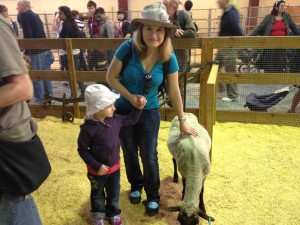 and inhaled. Handwashing tool selection may also contribute to the success of hand hygiene as a preventive measure, as some outbreak investigations have reported alcohol-based hand sanitizer was not protective against illness, especially when hands are soiled.
and inhaled. Handwashing tool selection may also contribute to the success of hand hygiene as a preventive measure, as some outbreak investigations have reported alcohol-based hand sanitizer was not protective against illness, especially when hands are soiled.
All the refs can be found in our 2012 paper, a sorta secret petting zoo shopper, Observation of public health risk behaviors, risk communication and hand hygiene at Kansas and Missouri petting zoos – 2010-2011.
Snappy title.
I’m fine with animal interactions; but people, and organizers, should be a lot more careful than they thought. That’s what I told my then 3-year-old’s daycare as they prepared for a chicken coop. I’m not sure people like that message.
Further, sanitizers have limited effectiveness, and in a petting zoo situation, so does handwashing; it’s only one component of an overall strategy to reduce risk. But it’s easy to say handwashing because that blames the patrons, not something else.
A table of petting zoo outbreaks is available at http://bites.ksu.edu/petting-zoos-outbreaks.
Erdozain G, Kukanich K, Chapman B, Powell D. 2012. Observation of public health risk behaviours, risk communication and hand hygiene at Kansas and Missouri petting zoos – 2010-2011. Zoonoses Public Health. 2012 Jul 30. doi: 10.1111/j.1863-2378.2012.01531.x. [Epub ahead of print]
Abstract below:
Observation of public health risk behaviors, risk communication and hand hygiene at Kansas and Missouri petting zoos – 2010-2011Outbreaks of human illness have been linked to visiting settings with animal contact throughout developed countries. This paper details an observational study of hand hygiene tool availability and recommendations; frequency of risky behavior; and, handwashing attempts by visitors in Kansas (9) and Missouri (4), U.S., petting zoos. Handwashing signs and hand hygiene stations were available at the exit of animal-contact areas in 10/13 and 8/13 petting zoos respectively. Risky behaviors were observed being performed at all petting zoos by at least one visitor. Frequently observed behaviors were: children (10/13 petting zoos) and adults (9/13 petting zoos) touching hands to face within animal-contact areas; animals licking children’s and adults’ hands (7/13 and 4/13 petting zoos, respectively); and children and adults drinking within animal-contact areas (5/13 petting zoos each). Of 574 visitors observed for hand hygiene when exiting animal-contact areas, 37% (n=214) of individuals attempted some type of hand hygiene, with male adults, female adults, and children attempting at similar rates (32%, 40%, and 37% respectively). Visitors were 4.8x more likely to wash their hands when a staff member was present within or at the exit to the animal-contact area (136/231, 59%) than when no staff member was present (78/343, 23%; p<0.001, OR=4.863, 95% C.I.=3.380-6.998). Visitors at zoos with a fence as a partial barrier to human-animal contact were 2.3x more likely to wash their hands (188/460, 40.9%) than visitors allowed to enter the animals’ yard for contact (26/114, 22.8%; p<0.001, OR= 2.339, 95% CI= 1.454-3.763). Inconsistencies existed in tool availability, signage, and supervision of animal-contact. Risk communication was poor, with few petting zoos outlining risks associated with animal-contact, or providing recommendations for precautions to be taken to reduce these risks.
 The four-star rated restaurant was fined more than $25,000 after a customer found a live cockroach in her chicken and mushroom risotto.
The four-star rated restaurant was fined more than $25,000 after a customer found a live cockroach in her chicken and mushroom risotto.


